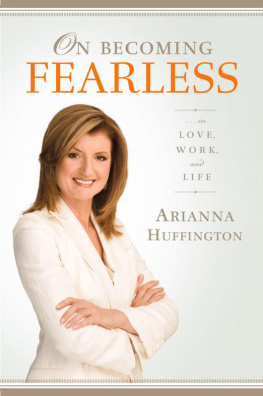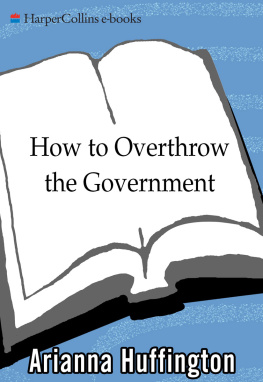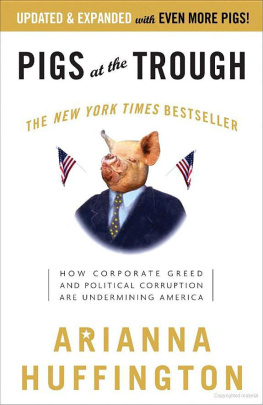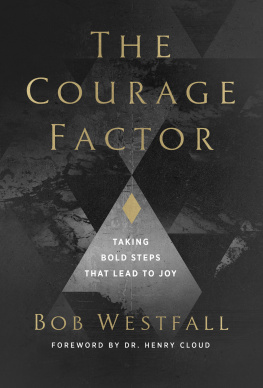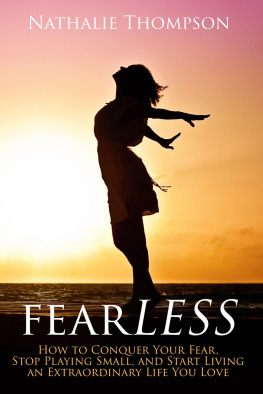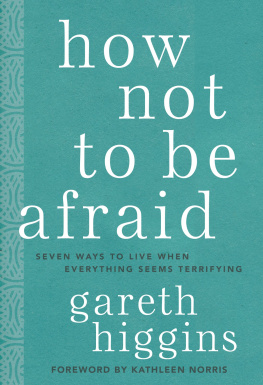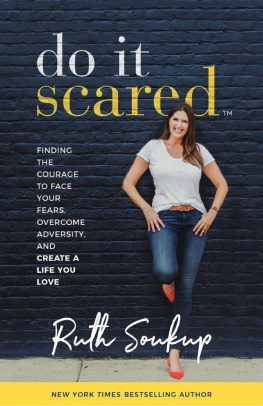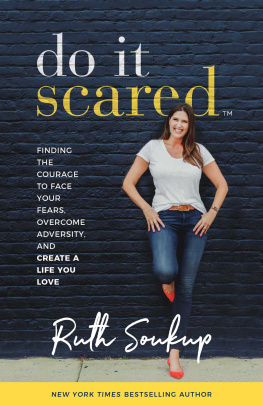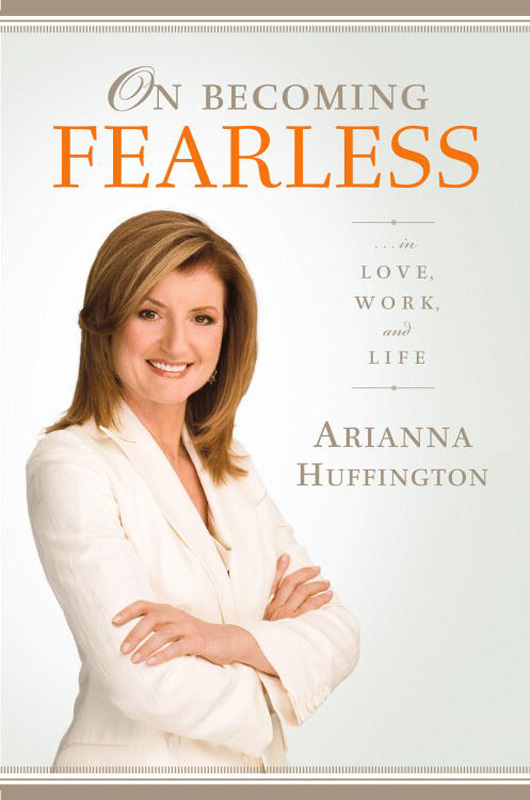Copyright 2006 by Arianna Huffington
"On Fearlessness" essays are individually copyrighted as follows: 2006 by Nora Ephron; 2006 by Susan L. Smalley; 2006 by Diane Keaton; 2006 by Kathleen M. Eldon; 2006 by Melina Kanakaredes; 2006 by Marcy Carsey; 2006 by Sherry Lansing; 2006 by Agapi Stassinopoulos; 2006 by Jody Williams; 2006 by Debrah Constance
All rights reserved. No part of this book may be reproduced in any form or by any electronic or mechanical means, including information storage and retrieval systems, without permission in writing from the publisher, except by a reviewer who may quote brief passages in a review.
Quotes on pages 81 82 and 152 from Anna Quindlen's Women's Commission for Refugee Women and Children speech are reprinted by permission of International Creative Management, Inc. Copyright 2006 by Anna Quindlen.
Little, Brown and Company
Hachette Book Group USA
237 Park Avenue, New York, NY 10017
Visit our Web site at www.HachetteBookGroupUSA.com
First eBook Edition: September 2006
ISBN: 978-0-759-56827-3
The Female Woman
After Reason
Maria Callas: The Woman Behind the Legend
The Gods of Greece
Picasso: Creator and Destroyer
The Fourth Instinct: The Call of the Soul
Greetings from the Lincoln Bedroom
How to Overthrow the Government
Pigs at the Trough: How Corporate Greed and Political Corruption Are Undermining America
Fanatics and Fools: The Game Plan for Winning Back America
For my mother, Elli, whose fearless spirit
permeates this book.
For my daughters, Christina and Isabella, as they
find their paths to fearlessness.
And for Kenny, my Huffington Post partner,
whose love and support have made my own
journey more fearless.
I REMEMBER IN February 1997 taking my then seven-and five-year-old daughters to an exhibition of Shakespeare's "Unruly Women" at the Folger Shakespeare Library in Washington. There was Portia in The Merchant of Venice, who takes on the whole Venetian legal world and uses the law to bring new, deeper insights to it. There was Beatrice in Much Ado About Nothing, and Rosalind in As You Like It, both of them "take no prisoners" women who ruffled the feathers of those birdbrains mindlessly parroting the status quo.
Fearless women come in all shapes, forms, ages, and professions. As Shakespeare put it, "Age cannot wither her, nor custom stale her infinite variety."
I wanted to take my daughters to that exhibition because it's never too early to teach women fearlessness. But now as I watch my girls in their teenage years, I'm stunned to see all the same classic fears I was burdened with: How attractive am I? Do people like me? Should I speak up? I wonder if their fears are more intense than mine were at their age or if they just seem more intense. I had thought that with all the gains feminism has brought, my daughters would not have to suffer through the fears I did. Yet here is our younger generation, as uncertain, doubting, and desperate as we were, trying to fulfill the expectations of others. What happened to our bold little girls?
As Mary Pipher puts it in her bestselling book Reviving Ophelia: Saving the Selves of Adolescent Girls, "Something dramatic happens to girls in early adolescence. Just as planes and ships disappear mysteriously into the Bermuda Triangle, so do the selves of girls go down in droves." Fears in teenage girls manifest in many ways: depression, eating disorders, drugs, casual and confusing sex. Young women, fixated on looks, thinness, and sexuality, are losing themselves in trying to gain approval from peers, grown-ups, and the overheated pop culture that surrounds them.
And yet, through the many case studies I've read, through the stories of women I admire, and, above all, through my own experience with my daughters, again and again I encounter moments of extraordinary strength, courage, and resilience, when fears are confronted, even overcome, and anything seems possible. It was my longing to somehow make these moments last that prompted me to write this bookfor my contemporaries, for our mothers, for our daughters.
CLINICAL ANXIETY DISORDERS associated with fear affect more than 20 million Americans. Science has shown that fear is hard-wired deep in our lizard brain. What differentiates us from one another are the situations that activate our individual alarms of danger. An armed burglar invading our home? A boyfriend not calling? An odd comment from a friend over lunch? An upcoming wedding toast you're expected to give? Starting a new job? Having to ask your boss for a raise? Saying good-bye to a bad relationship?
Fearssuch as fear of snakes, heights, and closed spacesare not biologically specific to gender, but some do tend to be more prevalent among women than men, including anuptaphobia: fear of staying single; arrhenphobia: fear of men; atelophobia: fear of imperfection; atychiphobia: fear of failure; cacophobia: fear of ugliness; eremophobia: fear of loneliness; gerascophobia: fear of growing old; glossophobia: fear of public speaking; katagelophobia: fear of ridicule; monophobia: fear of being alone; rhytiphobia: fear of getting wrinkles.
Every fear has a name. Whatever it is that frightens you has frightened someone before you. Fear is universal. It touches everyonebut it clearly doesn't stop everyone.
MY OWN BATTLES WITH FEAR
There have been many, many moments of fear in my life, but seven of them were criticaltimes when the fear was overwhelming but which taught me that it was possible to break through to the other side. To fearlessness.
The first experience of fear I remember was a particularly strange one. I was nine years old. Over dinner one night, my mother started telling my younger sister and me about the time during the Greek civil war, in the 1940s, when she fled to the mountains with two Jewish girls. As part of the Greek Red Cross, she was taking care of wounded soldiers and hiding the girls.
She described the night when German soldiers arrived at their cabin and started to shoot, threatening to kill everyone if the group did not surrender the Jews the Germans suspected (rightly) they were hiding. My mother, who spoke fluent German, stood up and told them categorically to put down their guns, that there were no Jews in their midst. And then she watched the German soldiers lower their guns and walk away. And just hearing it, I remember the fear rising inside me, not just fear for my mother and the danger she faced but fear for myself. How would I ever live up to this standard of fearlessness?
It was 1967, and a group of Greek generals had just staged a coup and established a dictatorship in Athens, where I lived. There was a curfew, and soldiers were stationed at every corner. I was seventeen years old and afraidtorn between the fear that paralyzed me and the desire to ignore the curfew and walk to my economics class so I could fulfill my dream of going to Cambridge University. I ignored the curfew and walked to class.
When I finally got into Cambridge, I instantly fell in love with the Cambridge Union, the university's famed debating society. But, to put it mildly, the Cambridge Union did not instantly fall in love with me. Even before starting my unrequited love affair, I had to overcome the barrier of having a heavy Greek accent in a world where accents really mattered. More important, I had to overcome the fear of criticism and ridicule. If I didn't, I knew I would never be able to speak fearlessly in public.

